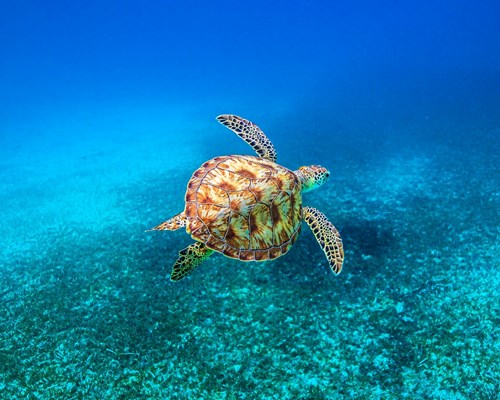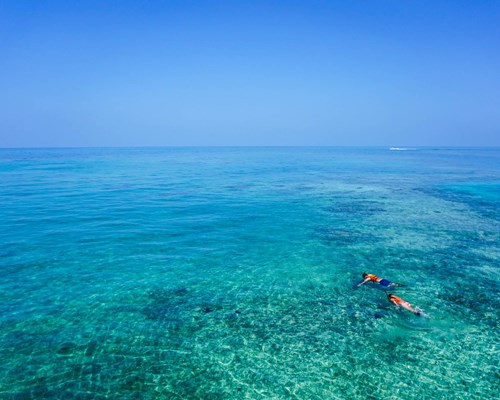Abaco Islands’ sun-drenched shores, clear waters and picturesque beaches are bursting with romantic energy. But these islands are also overflowing with adventures and activities too. Spend your days relaxing on one of the many soft-sanded beaches or exploring the shallow waters during a snorkelling trip. There is something for everyone to enjoy, and here are some of our favourite things to do on the Abaco Islands
Popular attractions & excursions in Abaco Islands

Pelican Cays Land and Sea Park
To the south of Tilloo Cay, four tiddly cays are edged with caves and coral reefs that are frequented by turtles and rays. The snorkelling around Sandy Cay is out of this world.

Tilloo Cay National Reserve
Eleven acres of coastline on Tilloo Cay, which faces the Atlantic. Amongst other tropical birds and seabirds, white-tailed tropicbirds nest here and can be seen flying around the cliffs. If you’re swimming or snorkelling, look out for giant starfish under the water.

Abaco National Park
Over twenty thousand acres of national parkland here protects the endangered Bahama Parrot and other wildlife. This is a brilliant area for birdwatching – beside the native parrots, look out for West Indian Woodpeckers and Cuban Emeralds. Within the thick pine forest, there are some fabulous nature trails.

Black Sound Cay National Reserve
Next to Green Turtle Cay, this two-acre mangrove reserve is birdwatching heaven. Waterfowl and avifauna spend their winters here, and the likes of painted bunting, American redstarts and magnolia warblers have been spotted feeding in the area.

Fowl Cays National Park
Bring a boat, and a snorkel – the reefs and trio of diving spots here are famously good. This newcomer to the national park club is between Scotland Cay and Man-O-War Cay, teeming with fish, turtles and other sea life.

Swimming Pigs at Noname Cay
The swimming pigs in the Exumas seem to get all the airtime, but it’s also possible to find some in the Abacos on a cay to the south of Green Turtle – and they’re charming. Noname Cay is uninhabited apart from these porky paddlers, bring some scraps of food and you’ll have some new best friends.

Man-O-War Cay
This is the boat building centre of the Bahamas, and has been so for generations. Most of the Man-O-War islanders are direct descendants of Loyalist settlers, and have carried on their trades - Joe Albury builds boats just like his great, great, great uncle once did before him (and absolutely smashing boats at that). In a classic, 19th century wooden home, visit the Heritage Museum for details of the island’s past. Life’s wonderfully peaceful over here, with narrow streets, colourful houses and artsy boutiques.

Great Guana Cay
Seven-mile-long Great Guana’s an isle of beautiful beaches and dunes. The private Bakers Bay Club – a guarded, gated Discovery Land community - hogs the northern end, enclosing well-heeled homeowners in a posh island hideaway. But you don’t need to be a Bakers Bay member to have a good time on Great Guana: hop on the boat from Marsh Harbour and bag yourself a bike or golf cart for the day. Laze, walk, swim, snorkel or kayak on the white-sand beach. Wander around gift shops or head up to the top point of the dunes for incredible view. Check out Nipper’s and Grabbers for cocktails and good food (Nipper’s Sunday pig roasts are the stuff of legend).

Green Turtle Cay
Loyalists settled here in the 18th century, naming the island after the green turtles that nested on it. The colonial village of New Plymouth has brightly painted clapboard buildings – islander’s homes, Bahamian restaurants, gift shops and museums – and friendly food markets. The Albert Lowe Museum tells the island’s history with photos, artefacts and models of Abaco ships. Don’t leave without trying a Goombay Smash and Miss Emily’s. Now that’s what we call a Caribbean rum punch. Get here via the ferry from Marsh Harbour, which takes about 15 minutes to reach the dock.

Elbow Cay
You might have heard it called Hope Town after its main settlement – however it’s referred to as Elbow Cay and this gorgeous little island is well worth a visit. Get off the 20-minute ferry from Marsh Harbour and zip around the place on a bike or golf cart (we prefer bikes, as they’re allowed anywhere on the island). Explore the sights, market stalls and shops of colonial Hope Town, rest on the beach or climb up to the top of the iconic, red-striped lighthouse. The Wyannie Malone Historical Museum tells of the island’s fascinating past – Lucayan Indians, Pirates, Wreckers, Loyalists and all. Just don’t leave without popping into Vernon’s grocery store to try his key lime pie.

Elbow Cay Lighthouse
Elbow Reef lighthouse in Hope Town was built in 1862. At first, locals were strongly opposed to it being built (having made livings salvaging shipwrecks). They even worked against it, faking signals to confuse ships. Now it’s a much-loved feature of the island, and locals have prevented it from becoming automated to preserve old-school customs. Over thirty metres high and painted in red and white stripes, it peers over a charming settlement of pastel-painted buildings. A hundred or so steps lead to the top – your reward being an incredible view of the surroundings.





